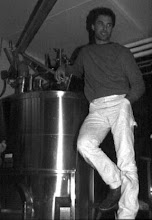A couple of weeks ago, I received an email from a fellow who has been following the news of our proposed new brewery for quite some time. A resident of Hampton, our future home town, he was writing to ask about the status of the project and pointed out that we were doing ourselves and our fans a disservice by maintaining a sphinx-like silence on the topic. "I was hoping to see construction begin this spring but it looks like there is nothing going on at the site," he wrote. "Rumours are spreading in town that the project has been scrapped due to the economy. If it is hasn't been scrapped you need to get out ahead of things on a PR basis and let your fans know what is going on. The lack of any discussion of the project on your website only fuels the rumours further."

Yes, the writer is correct - a lot of people have been wondering what's going on with Smuttynose and our future home at Towle Farm in Hampton, and here, at last, is our response. The purpose of this blog, with apologies to Mr. Blandings , is to provide not only ongoing updates on our progress, but also some background and history of our brewery and its plans for expansion. The short answer is Yes, we are moving ahead with our plans to build a new facility at Towle Farm in Hampton. We plan to start construction in the first half of 2010 and will be moving in about a year later, in 2011. But getting to that part of the story is actually a rather long and involved tale, so I'll start by asking for your patience and indulgence in advance. I'll post here from time to time in hopes of presenting this in bite-sized pieces. Let's begin with a quick thumbnail sketch of our growth and expansion up till now.
In 1994, the year we opened for business, Smuttynose Brewing owned only the six 40-barrel tanks that we purchased with the assets of the bankrupt Frank Jones brewery. Although none
 of these tanks was rated to hold pressure, a previous owner with little money and even less common sense had jury-rigged two of them to serve as pressured conditioning tanks. The brewery, with its small, twenty-barrel brewhouse, had a capacity of about 2,500 barrels a year. Within less than a year, we added four 50-barrel fermenters, purchased from Harpoon, which had outgrown them, two horizontal 100-barrel dairy tanks to be used for conditioning, and two vertical 180-barrel conditioning tanks that we acquired from a brewery in Buffalo which had closed its doors. This tripled our capacity, giving us the potential output of about 7,500 barrels a year. We grew into this capacity within four years.
of these tanks was rated to hold pressure, a previous owner with little money and even less common sense had jury-rigged two of them to serve as pressured conditioning tanks. The brewery, with its small, twenty-barrel brewhouse, had a capacity of about 2,500 barrels a year. Within less than a year, we added four 50-barrel fermenters, purchased from Harpoon, which had outgrown them, two horizontal 100-barrel dairy tanks to be used for conditioning, and two vertical 180-barrel conditioning tanks that we acquired from a brewery in Buffalo which had closed its doors. This tripled our capacity, giving us the potential output of about 7,500 barrels a year. We grew into this capacity within four years.
By 2005, our tank inventory consisted of the original six 40-barrel, nine 50-barrel & one 20-barrel fermenter, plus four horizontal and two vertical conditioning tanks. In 2006, we outgrew microbrewery status when our annual output exceeded 15,000 barrels. That year we purchased our first 200-barrel fermenter, whose 23-foot height required us to build an addition attached to the existing building. We have since purchased two more 200-barrel fermenters, building a new outside addition each time. In early 2006, we leased the other half of our building, adding about 11,000 square feet of warehouse space to our existing 12,500 square feet. We filled that space in a matter of weeks with packaging, raw materials and finished product.
In 2001, we replaced our old 20-barrel brewhouse with a 50-barrel brewhouse purchased from a brewery in Miami that had gone out of business and have since upgraded that brewhouse substantially, adding a whirlpool as well as a new mill and grain handling system. We've replaced & expanded our refrigeration system, and replaced & upgraded virtually all of our bottling and kegging lines.

This year, 2009, we expect to produce about 23,000 barrels, or about 310,000 cases’ worth of beer. To accommodate this growth, we will add two more 200-barrel tanks, a fermenter and a new conditioning tank, early this summer. Since we no longer have room outside the building for more additions, we now must find space inside the building, raising the roof by ten feet and reinforcing the floor to carry the weight of the new tanks (50,000 pounds apiece, including beer). The only spot inside the building with enough space for these tanks is where our hospitality room is currently located, so visitors to Smuttynose this summer will be greeted with a much smaller place to gather for tours. This space will accommodate only one additional tank, another 200-barrel fermenter, which we expect to add next spring. After that, expanding this facility will require a whole lot of creativity.
In my next post, I'll write about some of the early sites we considered for a new facility. As always, your comments & questions are welcome.

No comments:
Post a Comment